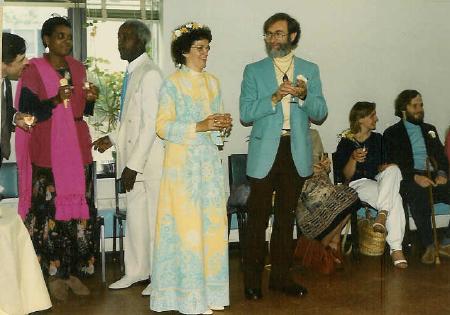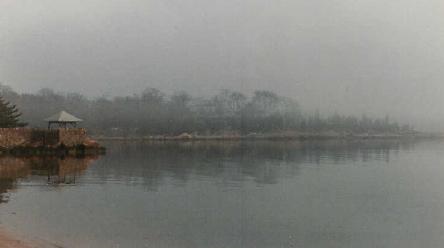Stories
Psychology for Revolutionaries
Psychology for Peace Activists
Why there are so few women warriors
The Seville Statement on Violence
A theory of mental illness
* * *
Lindsay says the air was pink that night. We met for the first time at the Christmas party of the Fair Haven Health Clinic in 1980. There was dance music and someone told her I was a professor at Wesleyan where she had graduated a few years before. As I recall, she approached me with the classic line, "Are you rich and single?" and I replied, "No, I'm not rich and that's my wife over there." Nina was also at the party, although we had been separated since August. Despite that first repartee, we later danced when she said the only person she could find to dance was a gay hairdresser, and when she learned that I was no longer living with my wife.
We became a couple but I would not be ready to get married for a few years yet. Lindsay came to visit me in the summer of 1981 in Holland (where we lived for a while on a tjalk houseboat in a small canal of Nordlaaren), and in Soviet Georgia, where Misha Nasberg took wonderful photos of us.
By the end of 1983, I was getting a divorce from Nina, and I bought a house for us in Short Beach. Then in 1984 we got married.

The wedding was a true political and community event. It was held in one of the three churches on the Green in the center of New Haven, and the church was half-filled with perhaps a hundred friends. The ceremony was presided by two ordained minister friends, Howard Parsons of American-Soviet Friendship (who wrote a beautiful poetic service) and Allie Perry, a pacifist active in the New Haven Community, and there were many speakers including our family members and political comrades from the Communist Party and American-Soviet Friendship, as well as messages from our congressman and the speaker of the state legislature.
Lindsay came with three teenage kids, a daughter Tracy who was the youngest, a son Jeff in the middle, and a son George, the eldest, who was severely retarded and institutionalized. Over the years I became like a father to George as we would see him once or twice a week as long as we were in the country. Tracy and Jeff had difficulty accepting me as a step-father. Tracy had a particularly rough period as a teenager with drinking, drugs, shop-lifting and truancy. Once when she said especially nasty remarks to her mother I threatened to strike her and her brother, who was physically larger than me, stepped between us and threatened me instead. It was difficult for me, but a good moment for the kids as they grew up supporting each other.

The bay across from our Short Beach home.
Lindsay is a good artist, but it is almost impossible to make money as an artist. She came the closest with a coloring book that she produced and sold in Paris (in museum shops of the Louvre and D'Orsay and various tourist shops), but it is very difficult to do business in France. Before we went to Paris she worked at Yale and was active in the Yale strike of 1984.
Lindsay accompanied and supported me in most of my international travels and projects including Seville, Yamoussoukro, and UNESCO in Paris.
 |
Stages
1986-1992
Fall of Soviet Empire
1992-1997
UNESCO Culture of Peace Programme